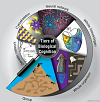
Autophagy, a guardian against neurodegeneration
Main Video
Intracellular protein misfolding/aggregation are features of many currently incurable late-onset neurodegenerative diseases, like Alzheimer's disease, Parkinson's disease and polyglutamine expansion diseases like Huntington's disease (HD) and various spinocerebellar ataxias. The mutations causing many of these diseases confer novel toxic functions on the target proteins. We showed that the autophagy inducer, rapamycin, reduced the levels of mutant huntingtin and attenuated its toxicity in cells, and in Drosophila and mouse HD models. We have extended the range of intracellular proteinopathy substrates that are cleared by autophagy to other related neurodegenerative disease targets and have provided proof-of-principle in cells, Drosophila and mice. In order to induce autophagy long-term, we have been striving to identify safer alternatives to the mTOR inhibitor, rapamycin. To this end, we have been trying to discover novel components of the autophagy machinery and new signalling pathways and drugs that impact on autophagy. While autophagy induction is protective in models of various neurodegenerative diseases, certain other conditions, including lysosomal storage disorders, are associated with compromised autophagy. I will review these data and then describe how impaired autophagy compromises cellular processes, including the ubiquitin-proteasome system.
Other videos from BioScience
-

American Chemical Soci...
By: caliban
20 December 2019 - 11:47 AM -

Bioelectric Computatio...
By: Mind
12 December 2018 - 10:39 PM -

Bioelectric Computatio...
By: Mind
12 December 2018 - 10:39 PM -

The first head transpl...
By: caliban
04 March 2015 - 12:31 AM -

A Monkey Head Transplant
By: caliban
03 March 2015 - 11:12 PM -

NAD and Age reversal pt 4
By: to age or not to age
26 August 2014 - 06:49 PM -

NAD and age reversal pt 3
By: to age or not to age
26 August 2014 - 06:47 PM -

David Sinclair Intervi...
By: YOLF
17 March 2014 - 10:23 AM -

Caleb Finch
By: caliban
08 May 2012 - 09:14 AM -

SENS5 - The Future of...
By: jdgauchat
21 December 2011 - 07:44 PM









































